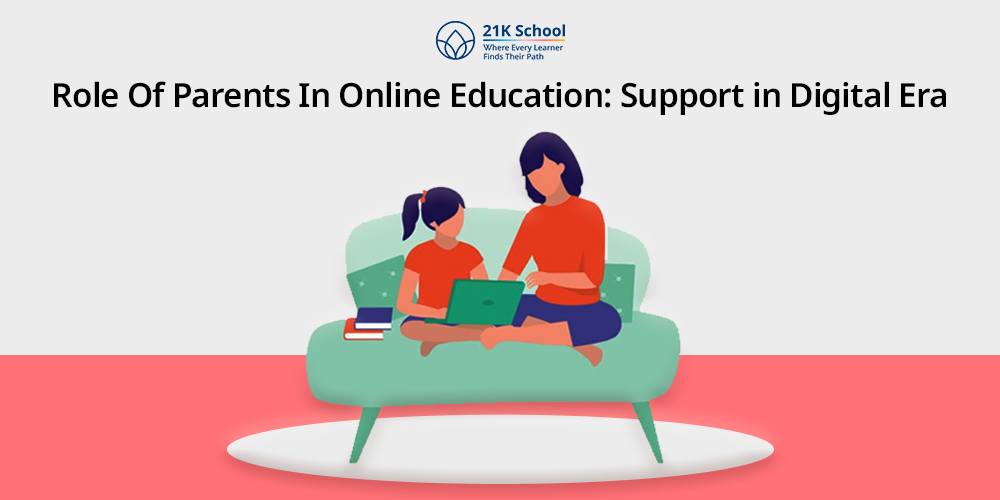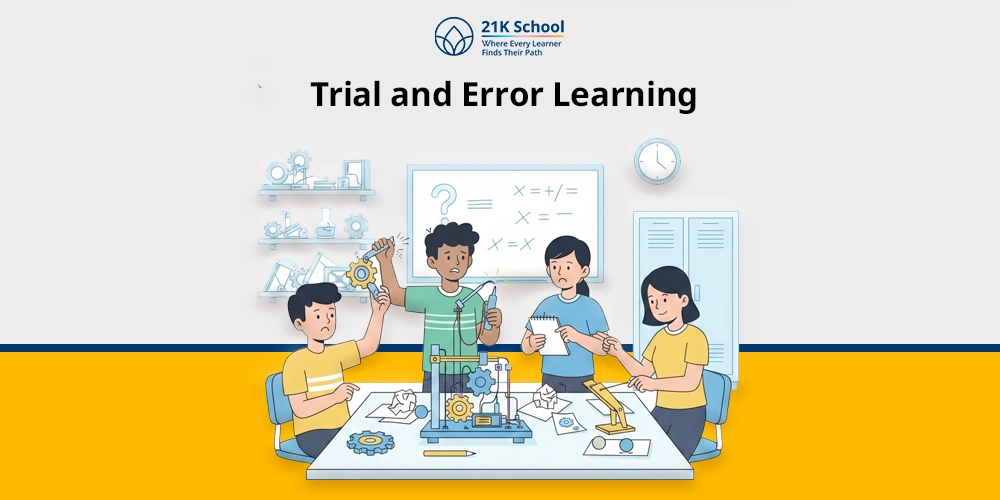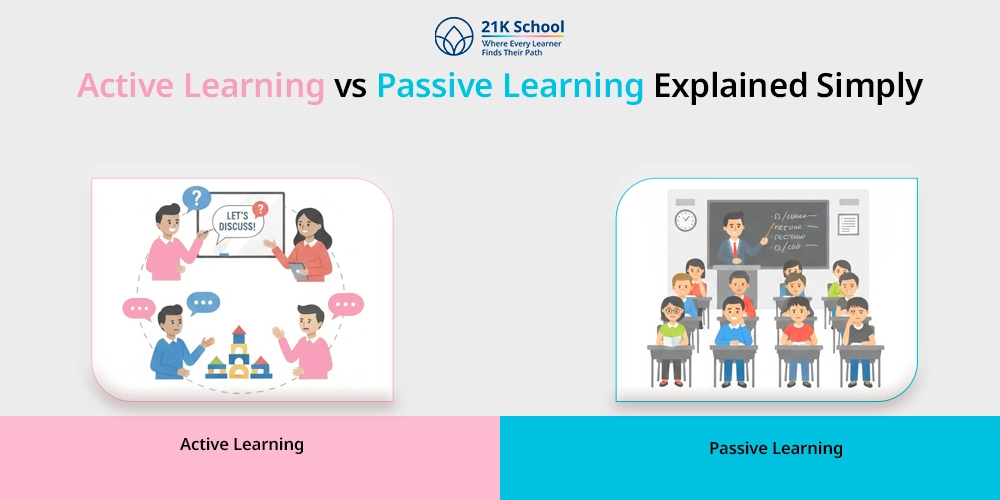
Did you remember the time when parents helping kids with homework just meant flipping through a textbook or solving a few math problems on paper?
With time things have changed. The role of parents in students life is way more than helping with homework.
In the digital era online education is changing the landscape of students’ education in the 21st century. It’s all about how children learn with technology.
Explore the rise of online education trends and statistics to get better future opportunities.
And to ensure kids are adapting to the new world requirements they need parents’ support and guidance.
Table of Contents
- 12 Key Role of Parents in Online Education
- 1. Creating a Supportive Learning Environment
- 2. Supporting Academic Success
- 3. Online Safety and Digital Citizenship
- 4. Advocacy and Collaboration
- 5. Promoting Positive Learning Habits
- 6. Taking Care Of Mental Health
- 7. Establish a Routine
- 8. Build a Strong Bond
- 9. Encourage Independence and Responsibility
- 10. Foster Open Communication
- 11. Engage in their Education and Extracurricular Activities
- 12. Seek Support When Needed
- Challenges Parents Face In Online Education
- How to Overcome Challenges Faced By Parents in Online Education?
- Conclusion: Empowering Digital Era!
12 Key Role of Parents in Online Education
Parents are an important part of child education, especially if it is online learning. Read how online education works for kids’ development.
By creating a supportive and structured learning environment, and providing academic assistance parents can and show students engagement in studies.
Here’s a detailed outlook of key roles of parents in online education of students:
1. Creating a Supportive Learning Environment
Creating a supportive learning environment is all about setting a schedule, designing a workspace, access to technology and many more.
It is one of the important responsibilities of parents which helps in creating a conducive learning environment at home.
By this way parents must bridge the gap between children and their time. This leads to clutter-free, and comfortable study.
2. Supporting Academic Success
Parents should support their children for academic success by creating a conducive learning environment, fostering a love of learning, and actively engaging with their child’s education.
This kind of support guides students to achieve academic success through attending classes, completing tasks on time, and staying engaged.
Providing constructive feedback, encouraging curiosity, and fostering a love for learning all contribute to a child’s scholastic achievement.
3. Online Safety and Digital Citizenship
Online safety and digital citizenship are the benefits parents seek for their children. It includes privacy, respect, and recognizing misinformation.
Parents during online learning actively participate with their children’s online activities. They provide guidance on safe and responsible online behavior, and foster open communication about their experiences.
4. Advocacy and Collaboration
In learning, parents play roles as both advocates and collaborators. It is an important part in supporting their children’s education.
Advocacy means ensuring they have access to necessary resources and support. However, collaboration includes connection between students, teachers and parents.
Parents need regular communication with teachers and school administrators to ensure children receive the support they need.
5. Promoting Positive Learning Habits
Promoting positive learning habits is a key to online education. By proper structure and consistency parents can encourage kids’ learning habits.
This can be done by creating a dedicated study space, time management, lifelong learning, increasing curiosity and communicating with teachers.
6. Taking Care Of Mental Health
During online education students can sometimes experience isolation, anxiety, or burnout feelings. In this case, parents need to take care of their child’s mental health and emotional well-being.
Signs such as lack of motivation, irritability, or withdrawal should be addressed promptly. Promote regular breaks, physical activity, and engaging in hobbies to support a healthy and balanced lifestyle.
7. Establish a Routine
Establishing a routine for online education of your child supports academic success and personal growth.
This can be done by setting up designated study spaces, helping build schedules, and familiarizing themselves with the online learning platform.
Parents need to help kids by creating a schedule and establishing a routine according to their classes. The design should include study time and break.
8. Build a Strong Bond
Building a strong bond always leads to sharing a good relationship. In the case of students the online learning setup allows parents to spend more time with their children.
This creates opportunities to strengthen familial bonds between them. Engaging in daily conversations, showing interest in their studies, and being emotionally available fosters trust and security.
9. Encourage Independence and Responsibility
Parents play an important role in students’ lives by encouraging independence and responsibility.
To do so parents need to create a supportive learning environment, providing guidance, and encouraging active learning.
10. Foster Open Communication
Online education fosters open communication between parents and students. This helps support a child’s future learning. Discover more about the future of online education .
Open communication happens by regular check-ins, reviewing progress, and collaborating on strategies to address any challenges.
11. Engage in their Education and Extracurricular Activities
Parents should understand that engaging in their education and extracurricular activities are both crucial for kids.
Providing a structured learning environment, monitoring academic progress, communicating with teachers, and encouraging learning helps kids in achieving goals.
Activities like gross motor skills activities and fine motor skills activities . However, online education includes participation in school events, virtual parent-teacher meetings.
12. Seek Support When Needed
Whether it’s a small help like homework tips or need a helping hand to make a simple science project parents should be available when kids seek support.
Parents can create a supportive learning environment, ensuring access to technology and resources, and actively engaging in communication with teachers and the school community.
Challenges Parents Face In Online Education
Parents face some challenges in online education which can affect academic and personal development.
To address concerns of parents of an online school curriculum read our latest blog.
Understanding these challenges help parents to overcome the situation. Here are some common solutions.
- Keeping Children Focused: Online education needs a dedicated and peaceful area. However, children struggle to stay focused during external distractions. Distractions such as TV, siblings, mobile devices etc.
- Balancing Work and Responsibilities: There are a lot of parents who get difficulties in balancing work and responsibilities together. The dual responsibility can lead to stress and reduced effectiveness in both roles.
- Technology and Internet Access: Technology and access to the internet can impact kids’ online learning. Parents need to focus on providing the resources to smooth learning especially during class.
- Lack of Social Interaction: Online education lacks the social interactions which can negatively impact kids’ mental health. This can also lead to independent learning which can be challenging for children.
How to Overcome Challenges Faced By Parents in Online Education?
Here is a detailed list of solutions parents can use to overcome the challenges of online education. Read some quick and easy tips for parents help kids successful in school .
- Establish a Routine: Distraction can be reduced by establishing a routine or schedule for online education. This includes times for classes, breaks, and other activities.
- Fill the Learning Gap: Parents can make a proper time schedule when they engage with kids and solve their problem by showing proper interest. By this way parents can connect with children and track their progress.
- Use Technology to Manage Distractions: There are numerous parental control apps and productivity tools that can help manage screen time and distraction especially when the kid is young. By blocking distracting websites, and setting time limits this challenge can be resolved. Parents can also use scheduling apps to coordinate activities and stay organized.
- Collaborate with Other Parents: To ensure the needs of your kid, parents can connect with other parents to share ideas, resources, and support. This will encourage parents to participate and understand the circumstances of students. By collaborating you can understand other parents view on education .
Also Read: The Rise, Treands and Statistics of Online Education in India!
Conclusion: Empowering Digital Era!
With time the digital era has redefined the educational landscape and the role of parents is changed. Homeschooling becomes an ideal option.
Also read – online schools for homeschooling parents .
It’s time to go digital and learn how can parents help their children succeed in online schools .
Now parents are crucial to ensure a child’s academic and personal development in the online realm. Schools like 21K school guide parents in each step.
By creating supportive environments, advocating for their children, ensuring safety, and promoting emotional well-being, parents become active partners in their children’s success.
Despite the challenges, the shift to online education provides a unique opportunity to build stronger family bonds and prepare them for a better future.
With empathy, structure, and proactive involvement, parents can turn online learning from a necessity into a powerful tool for growth and empowerment.



